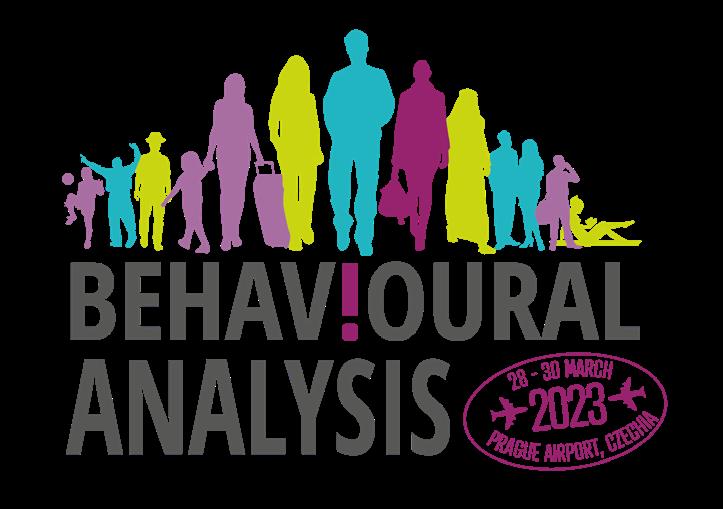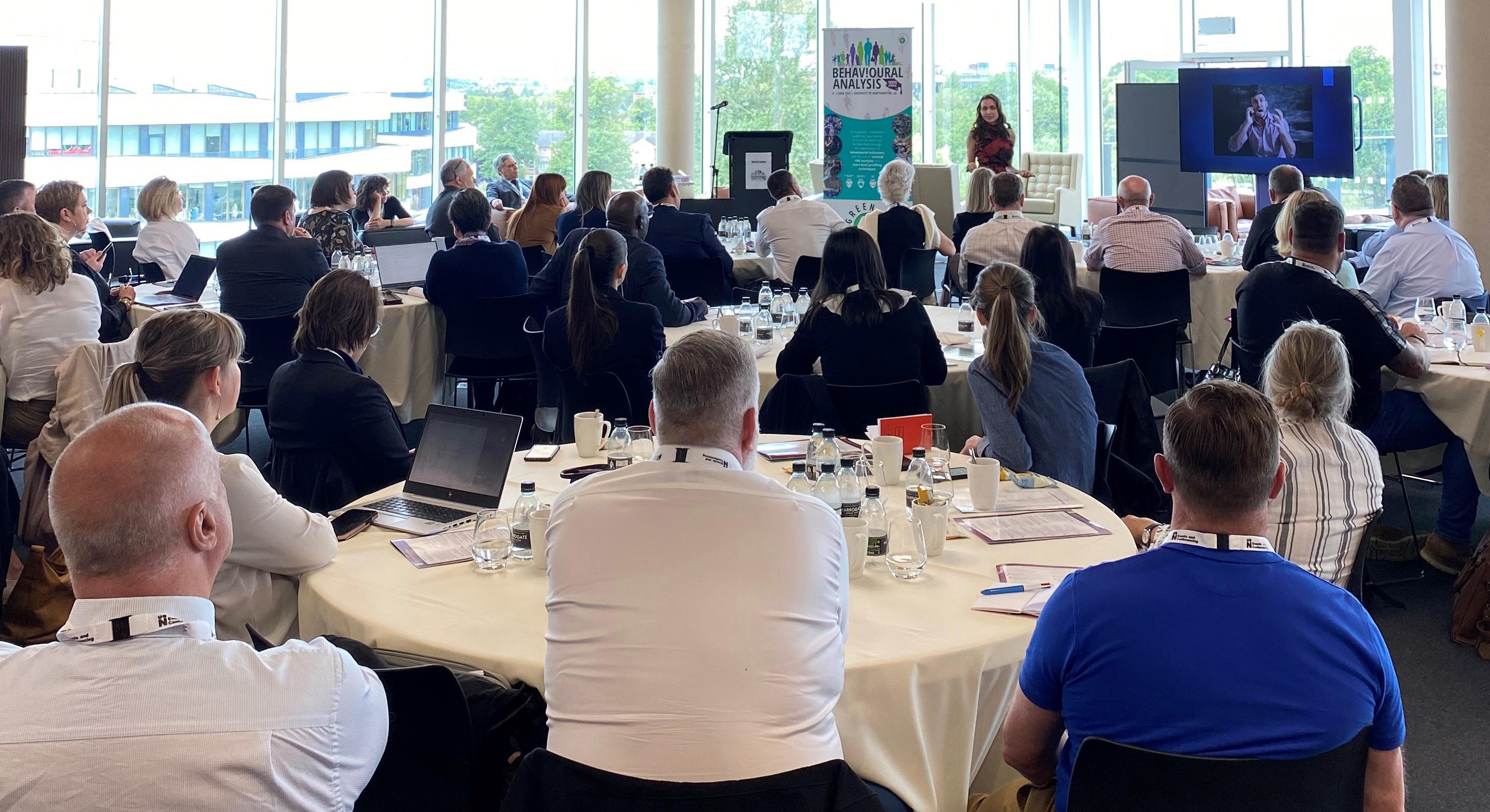
6 minute read
PROFILING: IT’S NOT A BAD WORD
Utter the word ‘profiling’ in a conversation regarding security countermeasures and many are quick to exclaim that such an approach to addressing the myriad of security challenges we face is unacceptable. Yet it is acceptable. There is a difference between ‘racial profiling’ where we distinguish between people based on their race or ethnicity and ‘profiling’ where, post-attack, we try to determine the likely perpetrators of a crime or pre-attack, where we seek to identify those people displaying hostile, negative or criminal intent – regardless as to the colour of their skin, their gender, religion or sexuality
Profiling is probably the most effective tool we have in our security arsenal, but in an era where we would rather rely on a technology alarming – thereby making the decision for us – it is often the technique we least embrace.
Despite this, we always tell the general public to “see something, say something”.
In an effort to encourage a better understanding of the ways in which we can identify potential threats based on observed behaviours, Green Light launched the Behavioural Analysis series of conferences in 2018. More than 130 speakers and delegates met at the Principality Stadium in Cardiff.
From there, in 2019, the conference moved to the USA when Mall of America served as the host. The 2020 event was held online due to the pandemic and last year was at the University of Northampton. Behavioural Analysis 2023 takes place in an airport setting – an environment where behaviour detection comes into its own – and already has a record number of delegates signed up to gather at Prague Airport, from 28-30 March 2023.
“The conference is designed to bring together security practitioners, keen to either benchmark or share best practice, and academics researching the true efficacy of behaviour detection,” according to conference chair and programme developer Philip Baum. It’s the event which strives to provide proof of concept.
The three-day programme encompasses a broad range of topics.
TUESDAY 28 MARCH: MORNING
In the opening session, two organisations valuing the contributions individuals can make to the identification of criminal and/or hostile intent will be presenting – the United Nations and the Airports Council International.
Dr. Aynabat Atayeva, the chief of the International Hub on Behavioural Insights to Counter Terrorism for the United Nations Office of CounterTerrorism, will be discussing how behavioural insights can help counter the terrorist threat, whilst Sébastien Colmant, director aviation and cyber security for ACI EUROPE, will be talking about the way in which behaviour detection training can both upskill aviation security personnel and, importantly, help attract and retain them. From the get-go, delegates will consider the realities of nonverbal communication.
Nonverbal communication analyst Mi Ridell will be considering the extent to which microexpressions can truly help identify potential threats, why security personnel may make errors in judgement (e.g. Halo Effect, Horns Effect & Othello Error) and how an individual’s emotional leakage might serve security’s best detection interests (from the Spotlight Effect to Duper’s Delight). From Argentina, psychologist Alan Crawley of Universidad del Salvador will set out why nonverbal communication is actually a delicate art! With the terrorist threat arguably being our greatest concern, understanding pre-attack behaviours of suicide bombers is obviously incredibly valuable. This is the subject criminologist Dr. Sagit Yehoshua, author of ‘Terrorist Minds: from socialpsychological profiling to assessing the risk’ will be addressing when she shares relevant data and CCTV footage from actual suicidal attacks.
TUESDAY 28 MARCH: AFTERNOON
One could argue that behavioural analysis is a behavioural science. In this vein, Aaron Le Boutillier, ASIS’ regional vice president (South-East Asia) and CEO of Le Boutillier Group, Thailand, will kick off the afternoon session with a dynamic presentation exploring whether neuroscience has a role in behavioural analysis training. For any organisation considering implementing a behaviour detection programme, it is critical to set the parameters and establish reasonable aims and objectives – a topic covered by Neville Hay, director of training with the INTERPORTPOLICE. And, the session ends with an operational example of how staff can be trained in emergency response with the aid of behavioural science…and, yes, The Simpsons! Kim Covent, an advisor with Belgium’s Ghent Local Police Force will be sharing their experience of a project run in collaboration with the Ghent Museum of Fine Arts. The first day ends with a sobering focus on human trafficking, an area where behaviour detection can really show huge benefits. Aside from an frontline operational police perspective from Canada, Dr. Sarah Lloyd, a senior trainer for Pace (Parents Against Child Exploitation) will be explaining how contextual safeguarding can help make hot spots cold, and, from the USA, Dr. Katariina Rosenblatt, the founder of There Is Hope For Me, Inc., and the author of ‘Stolen: The True Story of a Sex Trafficking Survivor’, will be sharing her very personal experience of being a victim, turned survivor, of human trafficking.
WEDNESDAY 29 MARCH: MORNING
The second day kicks off with an examination of cultural and sociological issues pertaining to behavioural analysis. Included in the opening session are two presentations from the host country, Czechia. Dr. Lenka Scheu of the Police University of the Czech Republic will, from a legal perspective, be asking whether racial profiling is avoidable and whether it is even wrong, whilst Dr. Barbora Vegrichtova, an Associate
Professor at the Czech Technical University will, citing examples from her work in the prison service, be examining criminal and extremist tattoos and symbols and demonstrating how they serve as clues to mindset and affiliation. Ever heard of Laban Movement Analysis? If not, Sandra Adiarte, of Australia’s Bond University, will explain all. It’s a question of observation. And, on the subject of observation, from an operational perspective Kanan Tandi will be presenting on sexual abuse on the Indian public transportation system and explaining how the definition of suspicious signs can help identify likely offenders. The morning session ends with a further operational case study - how crowds can be observed at open air, public events. Using the Signal Festival as an example, Jiří Cmunt will explain how the police, crowd management company and festival organisers cooperate to deliver safe and secure festivities.
WEDNESDAY 29 MARCH: AFTERNOON
Much of the second afternoon will focus on how, in the age of artificial intelligence (AI), technology can assist in the identification of negative intent. For example, might wearables become the modern lie detectors? The day will conclude with the second of the conference’s keynote presentations. Having also spoken at the very first Behavioural Analysis conference in Cardiff back in 2018, Dr. Cliff Lansley, of the Emotional Intelligence Academy and a familiar face on television screens as the scientific advisor to Warner Bros/Discovery Channel in their series ‘Faking it: Tears of a Crime’ (now in in its 6th Series), joins the line up again to explaining their six-channel analysis system.

THURSDAY 30 MARCH: MORNING
It’s a question of questioning. Resolving concerns through questioning techniques is the focus of the third morning. Dr. Abbie Maroño, a behavioural scientist and Director of Education at Social-Engineer, LLC, will be discussing non-verbal mimicry and its role as an elicitation technique during security interviewing. Behaviour analyst Thomas S. Karat will then explore deceptive strategies and acts of omission in high-stakes negotiations and interrogations. The session concludes with a presentation from a renowned researcher on the international academic circuit discussing one specific approach to investigative interviewing. Delegates will hear from the brains behind the Verifiability Approach, Prof. Galit Nahari, head of Department of Criminology at Bar-Ilan University, Israel
The insider threat is also one worthy of exploration. Elsine van Os, the CEO of Signpost Six, will be presenting some pointers as to how such threats might be identified, especially given that we are living in an era of geopolitical turmoil and post-pandemic change. And, from an aviation perspective, Dr. Karel Lehmert, the head of the CBRNe Forensic Sampling Laboratory in Czechia, will be setting out how behavioural profiling might help identify suicidal and homicidal pilots.
THURSDAY 30 MARCH: AFTERNOON
The aviation security theme continues after lunch. In the third keynote, Dr. María Carmen Feijoo Fernández, the chair of the ECAC Behaviour Detection Study Group and the head of behaviour detection at Adolfo Suárez Madrid Barajas Airport will be talking about airport security behaviour detection programmes and the industry’s quest for scientific proof of concept. All delegates will appreciate some real examples of behaviour detection identifying potential threats. From the US, Samuel Juchtman, who was the former head of security for El Al Israel Airlines in Prague, will, in his current capacity as COO for ACTSAviation Security, Inc. be sharing some real stories from the front line. And last, but by no means least, before delegates join the Prague Airport security team on operational tours of the airport, Zdeněk Truhlář, security strategy and administration director at Prague Airport, will be presenting on airport landside protection and how the airport secures its terminals and departure halls by an appropriate mix of technology, dedicated security personnel and general staff awareness. So, there you have it… and we haven’t even included all the presenters as a few key names have yet to confirm! But conference moderators, Philip Baum and Diana Nowek hope you will join them and their panels for three days of learning, benchmarking and the sharing of best practice in the art of profiling or, if you really can’t bring yourself to utter the phrase, then in the art of behaviour detection! L
FURTHER INFORMATION
To secure your place, visit: www.behaviouralanalysis.com
Debbie Rafferty MSc(Debz) has more than thirty years’ experience in the security and counter terrorism industry, she is currently researching a PhD in Criminology and Sociology at The University of Abertay. The following article is based on a Counter Terrorism Studies Masters Thesis titled “How do energy companies manage and mitigate the security of offshore oil and gas installations?” submitted to Liverpool John Moores University in 2020, and presented at the recent International Security Expo in London last September








